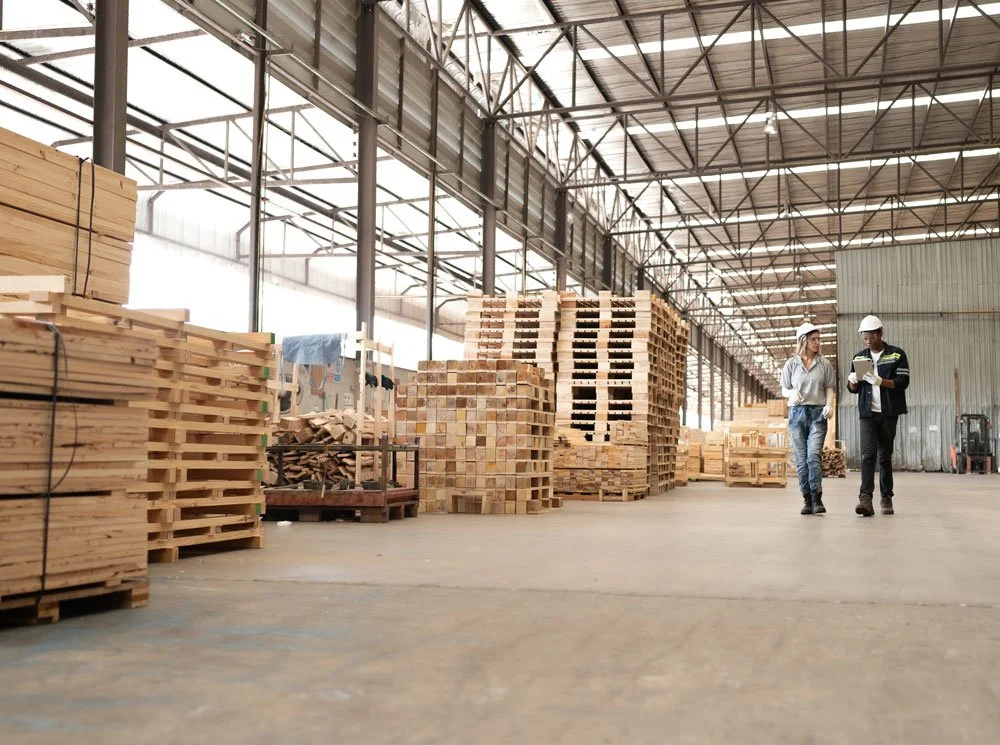Smart Management Strategies for the Pallet Industry
Pallets play a vital role in keeping pallet supply chains moving – from warehouses to retail stores, they are the backbone of global commerce. However, as demands on businesses become increasingly complex, simply having pallets is no longer sufficient. How you manage them matters just as much as the pallets themselves.
Smart management strategies help companies get the most value out of their pallet operations. By embracing innovative tools, making data-driven decisions, and fostering strong partnerships, businesses can reduce costs, minimize waste, and enhance supply chain efficiency.
At Olympic Forest Products, we’ve spent decades helping companies streamline their pallet management systems. Here’s our guide to smarter pallet management and how it can transform your operations.
Why Smart Management Matters in the Pallet Industry
The pallet industry has undergone significant evolution over the last decade. Rising costs of raw materials, increasing sustainability expectations, and heightened demand for on-time delivery have created new challenges. Without a clear management strategy, businesses risk incurring unnecessary expenses from lost or damaged pallets, inefficient inventory management, which can lead to shortages or overstocking, regulatory issues related to treatment standards and compliance, and/or increased environmental impact due to waste and poor recycling practices.
Smart management strategies are about taking a proactive approach. By combining technology, process improvement, and strong supplier relationships, companies can stay ahead of industry challenges and position themselves for growth.
5 Tips for Smart Supply Chain Management
1. Implement Pallet Tracking Technology
One of the cornerstones of smart management is visibility. Tracking pallets in real-time ensures you know the exact location of every pallet in your network, further reducing losses and optimizing utilization. Benefits of pallet tracking include:
Reduced Loss: Fewer misplaced or stolen pallets.
Data Insights: Better forecasting and planning based on usage trends.
Faster Recovery: Quick identification of issues like shortages or bottlenecks.
Modern tracking systems include barcode scanning, RFID tags, and GPS-enabled pallets for high-value shipments. These technologies provide actionable data that help companies make smarter decisions.
2. Optimize Pallet Inventory and Storage
Excess inventory ties up capital, while shortages disrupt production. Smart inventory management ensures you have the right number of pallets, in the right place, at the right time.
At Olympic Forest Products, we offer Vendor-Managed Inventory (VMI) solutions to help clients balance supply and demand. Our team works directly with businesses to forecast needs, maintain safety stock, and plan for peak seasons like the holidays.
3. Embrace Sustainability Practices
Sustainability is no longer optional — it’s a competitive advantage. Smart management means creating systems that reduce waste and environmental impact while improving your bottom line.
Sustainable strategies include:
Repair and Recovery Programs: Extending the lifespan of pallets through repairs rather than replacements.
Recycling Initiatives: Turning unusable pallets into mulch, animal bedding, or biofuel.
Sustainably Sourced Wood: Ensuring materials come from responsibly managed forests.
Eco-Friendly Materials: Considering plastic or composite pallets that can be recycled at the end of their life cycle.
Sustainable practices also help companies meet customer expectations and comply with environmental regulations.
4. Build Strong Supplier Relationships
Your pallet supplier isn’t just a vendor; they’re a strategic partner. Establishing strong relationships ensures you have the support and flexibility needed to adapt to market changes.
When choosing a partner, look for suppliers who:
Have a diverse network of mills and distribution centers.
Offer custom pallet design and consulting services.
Prioritize communication and transparency in every interaction.
Can scale with your business as you grow.
Olympic Forest Products collaborates with over 200 partners nationwide, enabling us to deliver customized solutions to clients across various industries, including manufacturing, agriculture, and e-commerce.
5. Use Data to Drive Decisions
Data-driven management is at the heart of smart strategies. By analyzing performance metrics, businesses can identify inefficiencies, forecast demand, and make informed decisions.
Key metrics to track include:
Pallet turnover rates, used to measure the efficiency of pallet management.
Repair versus Replacement Costs for Budget Optimization.
Environmental impact data for sustainability reporting.
With the right data, companies can turn pallet management into a competitive advantage rather than a cost center.
6. Plan for Peak Seasons
Supply chain demands fluctuate throughout the year. Smart pallet management includes preparing for high-volume periods, such as the holiday season or agricultural harvests.
Strategies for peak season include:
Increasing safety stock in advance.
Scheduling extra transportation and logistics resources.
Using historical data to anticipate spikes in demand.
Proactive planning prevents disruptions and ensures customers receive products on time.
Partner with Olympic Forest Products for Smarter Pallet Management
Smart management in the pallet industry is about more than just logistics — it’s about creating a sustainable, efficient, and scalable system that supports long-term growth.
At Olympic Forest Products, we combine decades of experience with innovative solutions to help businesses optimize their pallet strategies. From advanced inventory systems to sustainable recycling programs, we’re here to support every step of your supply chain journey.
Contact us today to discover how our intelligent management solutions can enhance your pallet operations.

